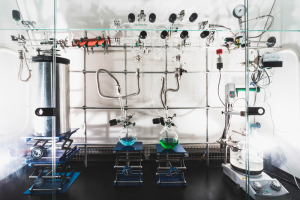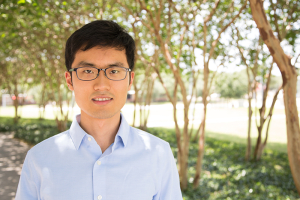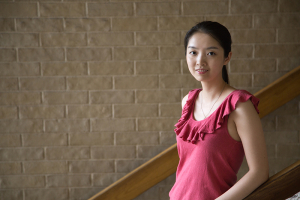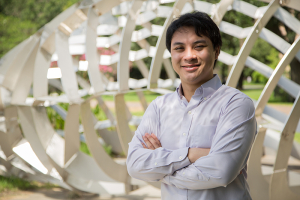The UH Cullen College of Engineering hosted this year’s Southwest Catalysis Society (SWCS) Symposium on April 22, 2016. The symposium provides an opportunity for engineering students from across the region to present their research to an esteemed crowd of international researchers and industry professionals.
This year, three Ph.D. candidates from the Cullen College’s chemical and biomolecular engineering department won poster awards for outstanding presentations. From reducing auto emissions to developing alternative fuels, the winners showcased the array of groundbreaking research taking place inside UH’s chemical and biomolecular laboratories.
Yufeng Shen, a third-year doctoral student and advisee of Ernest J. and Barbara M. Henley associate professor Jeffrey Rimer, researches catalysts that can convert methanol from natural gas to hydrocarbons, a compound essential to many everyday applications including plastics and gasoline.
Shen said he was interested in working in Rimer’s laboratory at UH because of his focus on synthesizing catalysts.
“When I first joined [the group], I began building a reactor to test the performance of the catalysts we synthesized. That’s the part I enjoy the most—running the experiments and testing,” he said.
For the SWCS Symposium, Shen presented his work on the synthesized catalyst CSM-11 in his poster titled “The Effect of CSM-11 Crystal Size on Methanol to Hydrocarbon Reaction.” Methanol, if efficiently converted to hydrocarbons through a catalyst such as CSM-11, could potentially be used as an alternative to crude oil for the production of various chemicals and fuel.
Shen said the symposium provided him an opportunity to gain new insights from leaders in the field and network with fellow graduate students.
“It’s a good opportunity to broaden our horizons,” Shen said. “Most of the time we’re in the lab, we are so focused on our own research. But, at the symposium, we had a chance to learn what other people in the field are doing.”
Under the guidance of Michael Harold, M.D. Anderson professor and chair of chemical and biomolecular engineering, fourth-year doctoral student Mengmeng Li investigates the catalytic reduction of nitrogen oxide, or NOx, related to lean-burn vehicles.
Due to regulations set forth by the Environmental Protection Agency (EPA), automobile manufacturers are currently exploring methods to increase fuel economy while reducing the harmful gasses, such as NOx, that are emitted from vehicles.
With funding from an auto manufacturer, Li used a small-scale model catalyst to study the reaction mechanism—or the step-by-step sequence of reactions that lead to overall change—for NOx storage and reduction. The results of her research were presented in her posted titled “Reductant Effects During Fast NOx Storage and Reduction.”
Li said that Harold played an invaluable role in her research by providing her guidance and sharing his expertise along the way.
“I enjoy working in Dr. Harold’s lab because I can study environmental catalysis and he is such an expert in the field of chemical reaction engineering,” she said.
Exposure for this research is not new for Li. She has been published in several top research journals, including one publication in Applied Catalysis B and two publications in Catalysis Today just this year. Even though she has presented her work during many professional conferences, she said winning the SWCS poster award was a unique honor.
“At first, people might find it hard to understand your research when it’s in a different area, but with the poster presentation, I had the chance to introduce and explain my research to the audience,” she said.
Echoing Shen, Li said that the symposium provided her the chance to share and combine ideas with others beyond her own research area.
“Talking to other chemical engineers really enriched my knowledge and helped me think outside the box,” she said.
Quan Do, a second year doctoral student working with assistant professor Lars Grabow, said he was drawn to the University of Houston by his interest in the oil and gas industry. At the Cullen College, he researches the potential for natural gas—or methane—to play a larger, more sustainable role in energy by forming chemical hydrocarbon derivatives, such as ethylene.
Do is looking for new ways to efficiently couple methane, which is a stable single-carbon molecule, to form ethane or ethylene, which are two-carbon molecules. Current methods rely on oxygen to facilitate the coupling process, but often result in undesirable byproducts, such as carbon monoxide and carbon dioxide.
To avoid creating these byproducts, Do is researching a “chemical looping process” using transition metals to break the hydrogen-carbon bonds in methane. In this novel process, the transition metal serves as the catalyst, pulling the hydrogen from the methane molecule to form a metal hydride. The metal hydride is then either heated or treated with oxygen in a reactor, which regenerates the original metal so that it can be reused as a catalyst. Ideally, this process would break one hydrogen from the methane, allowing the molecules to bond and form ethylene.
So far, however, the five transition metals Do has explored—scandium, titanium, yttrium, zirconium and hafnium—break all four of the hydrogen bonds in methane instead of just a single one. He said his next step is to test the chemical looping process using combined transition metals to achieve the desired result.
His poster, titled “The Catalytic Dehydrogenation of Methane Using Transition Metals as Hydrogen Storage Materials,” describes both his computational and experimental research, and elaborates on the next steps he plans to take in this work.
Though his research indicates more work ahead of him, Do said he felt confident about his presentation at the symposium. “I think the judges appreciated my presentation, overall—my explanation and enthusiasm for the work,” he said.
He also said that Grabow also provides an important perspective as his faculty advisor, helping to keep him motivated and on track. “I think a lot of grad students, especially engineering students, become so focused on their research that they can burn out,” he said. “[Grabow] is very encouraging. He recognizes that students need to push themselves but also explore their interests outside of the lab to produce good work.”



